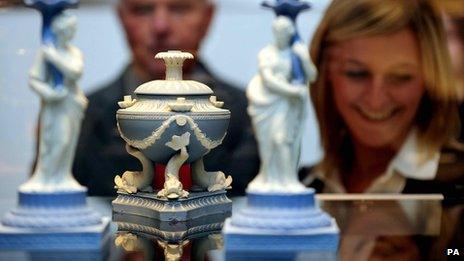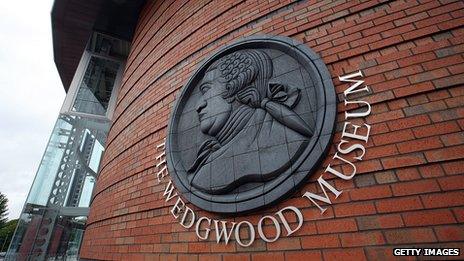Time for the art world to thank Lottery ticket buyers?
- Published

After a generous donation from the Heritage Lottery Fund helps save the Wedgwood Collection for the nation, isn't it time for the punters who buy tickets week in, week out to get some thanks?
It has been all smiles at the Wedgwood Museum this week after its staff found out at the end of last week that they still have a collection to display. Incredibly, that was very nearly not the case.
The award-winning visitor attraction came within a whisker of loosing its remarkable 80,000-item collection due to an overlooked clause in the pension scheme run by the now defunct Waterford Wedgwood PLC.
When the PLC went into administration in 2009, without the £134 million needed to honour the pensions of its 8000 employees, past and present, it came to light that five of those affected worked at the Wedgwood Museum. This triggered a 'last man standing' clause in the pension particulars, making the museum liable for the entire pension deficit. So, inevitably, it too went into administration, leaving an outstanding collection of Wedgwood ceramics stretching back 250-years at the mercy of the administrator, who duly took legal advice. The upshot of which was permission to sell the collection to help fill the pension black hole.
A rescue mission was then launched, spearheaded by the Art Fund, who struck a deal with the administrator. It was agreed that if the Art Fund could raise the agreed figure of £15.75m before November 2014 the collection would be the Art Fund's to do with what it wished.
The Art Fund would then hand the collection over to the V&A museum who would become its legal owners and would immediately loan it back to the Wedgwood Museum for the foreseeable future.

As it turned out, the Art Fund was able to raise the money in short order, and had hit the £15.75m target by the first week in October. All of which is good news, plus the Art Fund says the PPF (Pension Protection Fund) will now underwrite what's left of the pension black hole to ensure all Waterford Wedgwood PLC pensions are honoured. Everyone's a winner.
With, perhaps, one exception: the unsung heroes behind the saving of this magnificent collection…
Of the £15.75m required, the vast majority - by which I mean over £11m - was provided (indirectly) by those members of the public who like a flutter.
To be specific: Bet365 - currently one of Stoke's largest companies - donated £250,000 to the cause via its foundation. A generous offering that was dwarfed by the whopping £10.8m handed over by the Heritage Lottery Fund (HLF), a body set up to distribute proceeds generated by the National Lottery for 'good causes'.
Here, one would have thought, was an opportunity for the National Lottery and the HLF to thank all those millions of punters who buy a National Lottery ticket every week for being personally responsible for helping save for the nation what has been described as the UK's most important collection of industrial design.
The story of Wedgwood is one that would appeal to anyone in the country. Josiah Wedgwood, the founder of the company, was a quite a guy - a sort of Steve Jobs of his day - who built an aspirational brand that was revered around the world by prioritising design and innovation. He also campaigned against slavery, helped get the country's canal system going, and built nice houses for his employees. He was, by almost any measure, a great man.
But neither the National Lottery nor the HLF have yet made a song-and-dance about what all those ticket buyers had contributed to. In fact, they don't appear to have made the connection at all.
Saturday's BBC 1 National Lottery show didn't give it a passing mention and, almost a week later, there isn't any obvious reference to the Wedgwood Collection on the National Lottery website.
It is featured on the HLF's website, but then there's not so much as a nod towards all those millions of individual ticket buyers that made the purchase of the collection possible. Instead the HLF appears to want to distance itself from the punters that are the source of its income by limiting the connection to a cold, corporate statement that it uses "money raised by the National Lottery".
Why the standoffishness? Wouldn't Lottery ticket buyers be interested to know what they had helped achieve? I think so. Wouldn't they be more likely to visit the Wedgwood museum if the connection had been made? Probably. More, shouldn't there be benefits for Lottery players at the hundreds of arts and cultural centres they have helped create, renovate or improve? Quite possibly.
The inference to the non-aligned public communications of the National Lottery and HLF could be construed as condescending, snobbish and divisive, suggesting perhaps that they think the sort of people who play the Lottery aren't interested in culture, and the sort of people interested in culture aren't interested in the Lottery.
Neither of which is true in my experience.